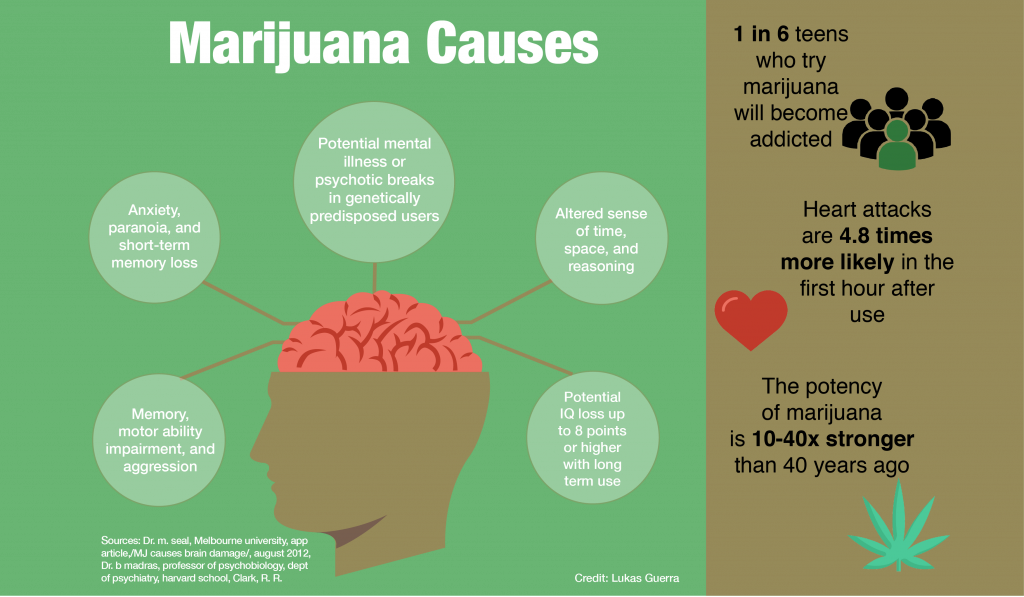Pot can have disastrous effects on mental health
Lukas Guerra
Christopher Columbus High School
At age 25, Gabe Howard spent four days in a psychiatric ward. He was diagnosed as bipolar.
When released, Howard began experimenting with marijuana. For the next four years, marijuana served as his self-medication of choice.
“I abused marijuana and I did a lot of other drugs as well. I pretty much did whatever I could get my hands on to feel better,” Howard said.
Now 42, Howard’s informal treatment plan has become more accepted. Eleven states have now fully legalized marijuana and 34 states have legalized it for medicinal use.
While marijuana has legitimate medical uses, there is growing evidence that some users are at risk of developing mental illnesses such as schizophrenia and psychosis due to ingestion of Tetrahydrocannabinol (THC), the psychoactive agent in pot.

The potential hazards are substantial. The Drug Abuse Warning Network found that of 1.25 million illicit-drug-related emergency department visits in 2011, 455,668 were marijuana related.
The National Survey on Drug Use and Health found that about 1.7 million Floridians were regular recreational users in 2017, a number that has increased in recent years.
A study published in Biological Psychiatry found that marijuana users who carry the AKT1 gene, which affects dopamine signaling in the brain, are seven times more likely to develop psychosis than an infrequent user or someone who does not smoke at all. Those with a genetic predisposition for mental illness risk triggering a condition’s onset as a result of extended cannabis use.
Alex Berenson, author of Tell Your Children: The Truth About Marijuana, Mental Illness, And Violence, explains that the development of mental illnesses in relation to cannabis is also more common in people whose relatives were previously affected.
“People with a family history of psychosis or schizophrenia are clearly at greater risk,” Berenson said. “The closer the relative, the greater the risk.”
Gayle Giese chairs the Advocacy Group for the National Alliance on Mental Illness in Broward County. The mother of a schizophrenic son, she saw firsthand how marijuana can affect a young mind. Her son used marijuana to deal with social anxiety in high school, and eventually had a psychotic episode.
“We didn’t know what had caused it and maybe the pot had been laced with something more dangerous and that maybe his psychosis was drug related,” Giese said. “But, it turns out it was the beginning of schizophrenia and our lives became very traumatic because we didn’t know what was happening.”
Giese explained how the lack of timely treatment can worsen psychotic symptoms and lead to serious long-term problems.
“Once somebody has a bad psychotic break, if it’s not treated immediately with a good first episode psychosis program, it can lead to more psychotic breaks and a more serious illness and a poor prognosis for recovery,” Giese said.
Giese said the potential problems associated with cannabis use outweigh the benefits.
“[Psychosis and schizophrenia occur in the] late teens and early adulthood, specifically in males,” Giese said. “For females, schizophrenia often occurs a little later, mid-twenties to early thirties, so I wouldn’t take any chances of smoking pot. Why take the risk?”
Many people use cannabis to ease the difficult symptoms these mental conditions cause. They are aware of the dangers that cannabis could present and are careful not to use marijuana in conjunction with their anti-psychotic medicine to prevent harmful side effects.
One schizophrenic cannabis user, who asked to remain anonymous, smokes marijuana to deal with stress.
“It’s my life. I take medication, that’s it. It relaxes me. I used to be really stressed out,” the source said. “Before I didn’t know what to do and I just needed to chill out, so I started smoking weed with my friends.”
Since the research is relatively new there have not been any significant guidelines created to address the issue of cannabis-induced mental illnesses.